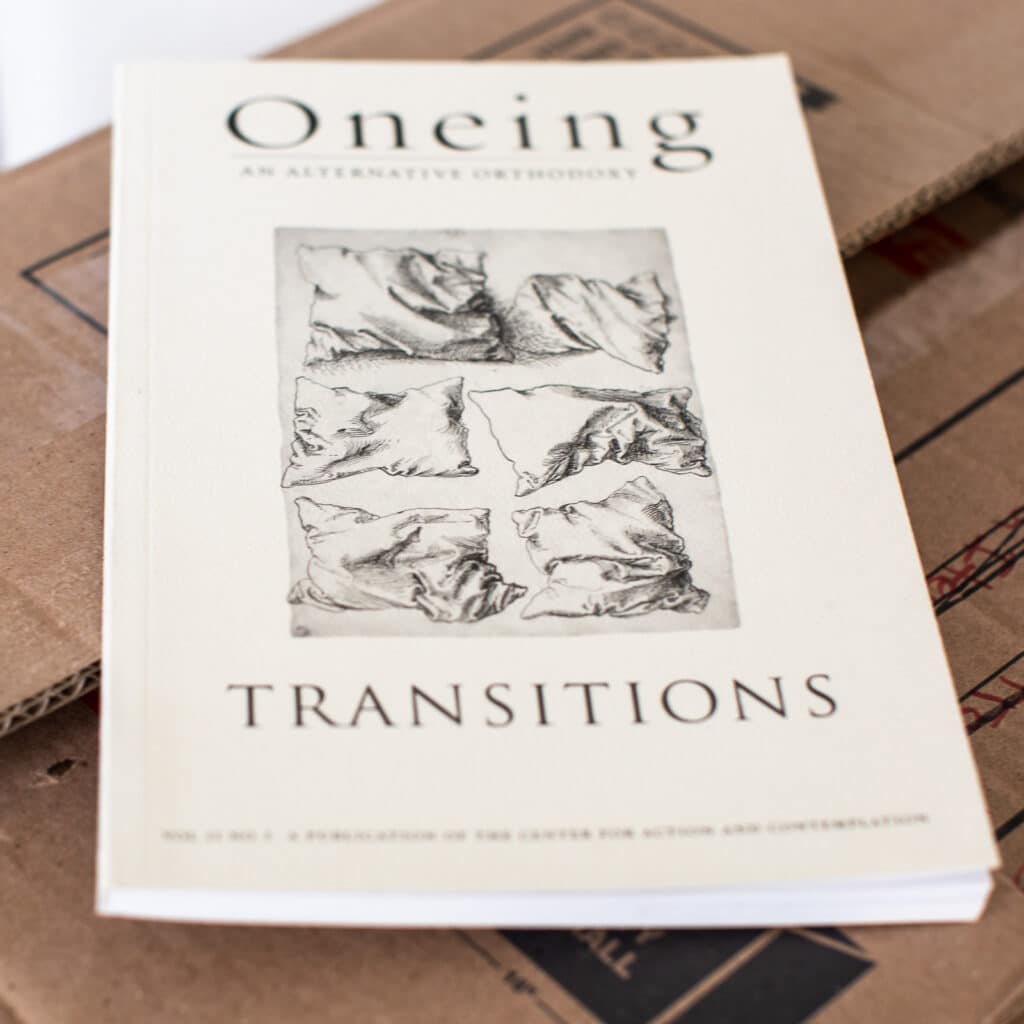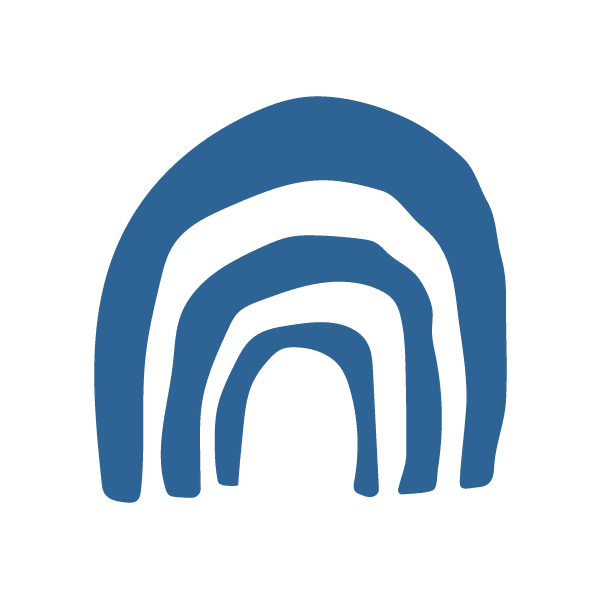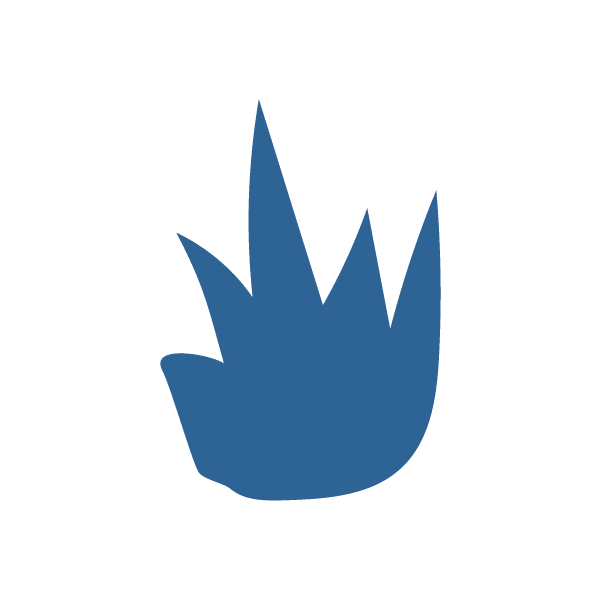Flying Loose in Turbulent Times

What is your instinctual reaction when the world starts spinning out of control? Pastor and pilot Cameron Timble, invites us to loosen our grip in this powerful article from Oneing: Transitions. Join us in finding new ways to manage turbulence in our lives and the world in this moving article from the We Conspire series.
Loosen your grip on the yoke,” my instructor said to me, looking out the window at the clouds growing more ominous by the minute. I was early in my aviation instrument certification training, and we had decided to make the journey from Atlanta, Georgia, down to a small airport near Panama City Beach, Florida.
I held the yoke of my aircraft between my pointer finger and thumb.
“Fly loose,” he said.
“Roger that,” I replied. I looked out the window and couldn’t see anything. I had no sense of the horizon, whether my wings were level, or our distance from the ground. I was in true “instrument conditions,” relying on my flight deck panel to tell me that we were safe.
“We are going to hit some turbulence ahead,” he went on, “and you will learn something about your airplane I hope you never forget.”
I looked over at him. He continued, “These machines are made to fly. They are designed to maintain steady, stable flight. If you tighten your grip on the yoke, you reduce the aerodynamics of your aircraft. You, as the pilot, actually make the flight less safe, steady, and stable. So, remember: When the going gets rough, fly loose on the yoke.”

“We are living through the breakdown and breaking open of much that has defined modern life.” – Cameron Timble
The wind came at us suddenly, tossing us all over the place. Every instinct in me said to grip the yoke tightly to control the plane. But I kept only my fingers on the yoke, offering small corrections to ensure we maintained a wings-level attitude. Within ten minutes, we broke through the clouds, transitioning safely to the other side.
I’ve reflected a great deal on that lesson from many years ago. When you hit turbulence, fly loose. Our world today is nothing if not swirling, turbulent wind tossing us around. In just the past few years, we have experienced economic meltdown, climate countdown, racial throwdown, political break-down, technology showdown, and religious letdown. We are living through the breakdown and breaking open of much that has defined modern life.
In the face of such extraordinary transition, it’s natural to look for solutions to our problems. In this way, we tightly grip the yoke of our families, businesses, government, and communities, trying to regain control of people and systems that feel broken and dangerous to our safety and survival. Of course, no amount of control will create the conditions needed to traverse these rough winds of change. In fact, authoritarian control may very well send us into a collective tailspin.
“Your altitude gives you access to certain views of the world. Changing altitude can broaden or narrow your understanding of all that exists in that world.” – Cameron Timble

The great temptation in the face of disruption and destabilization is to locate the problem in a “broken system.” Yet, “What if our systems are not broken?” my mentor and leadership consultant, Mel Toomey, once asked me. “What if something is missing?”
In the face of transitions, our first reaction is to move toward resolution. We engage in endless root-cause analysis. Yet, when something is missing from a system, there is no cause. We then must move in the opposite direction, looking for relationships that could generate the results we are seeking. These relationships have been present all along but have remained unlocated and un- or misidentified in the current system. When we move back and broaden our view, we grant ourselves access to see new possibilities in apparently random patterns.
When you fly 2,000 feet above the ground, you can see roads, neighborhoods, and even people walking around. You can’t see changing terrain. But when you increase your altitude to 45,000 feet, you can now see that those roads, neighborhoods, and people are connected to a much larger landscape, one with mountains, rivers, and vast plains. Your altitude gives you access to certain views of the world. Changing altitude can broaden or narrow your understanding of all that exists in that world.

“The greatest transition we must make in this point of human development is decentering ourselves as the most important characters in the story of cosmic creation.” – Cameron Timble
As Toomey once explained to me in a coaching session: “What is missing today in our systems is a level of integrity that exceeds what has been needed up to this point in human development. I don’t mean “integrity” in a moral sense, though it can have moral implications. I am speaking of integrity in a conceptual senseintegrity as wholeness. As systems evolve and begin to produce the results that they were designed for, they reach a point where they produce those results in such abundance that there is a breakdown. It’s a breakdown in integrity. We as participants in these systems ignore “what is so” to a scale of Dysfunction.”
Certainly, we can see that the systems designed in the EuroAmerican imagination have reached the point of dysfunction. We have ignored the unjust impacts of that imagination which built its power on the transatlantic slave trade; the stealing of land, health, and wealth from indigenous people; the domination of capitalist consumerism at the expense of a sustainable planet … you get my point.
So, the world as we know it is transitioning from one grand imagination centering the supremacy of whiteness to a much larger imagination that holds greater integrity in a reality that has been present all along but unacknowledged to date.
This new world coming into being faces genesis questions that fundamentally shape our field of possibility. Will our political system serve the whole? Will our healthcare system prevent illness or promote it? Will we live in service to our environment or continue our path of certain destruction? Will our technology accelerate our learning and development, or will it generate new forms of control and oppression? In other words: Who shall we be in this new world, and what world shall we create in service of that being? Professor and futurist Bayo Akomolafe pushes us to imagine even further. The transition we must undertake, he states, is one of a shift in Anthropocene, the understanding of humans as the center of the story.
Akomolafe declares: “Liberal humanist, modernist thinking situates humans at the center of the room: We are in charge, generally superior to all other kinds of life on the planet, and we live on the planet…Quite literally, we are not the planet in its ongoing materiality we are lords of the realm. So, we think in terms of this linear, anorexic space. We live in this tiny humanist bubble, and we deal with the marks on the bubble, the hieroglyphics on the bubble.”
The greatest transition we must make in this point of human development is decentering ourselves as the most important characters in the story of cosmic creation.
“We must resist looking to the frameworks of the past to lead us into the future.” – Cameron Timble

Rabbi Rami Shapiro helps us understand this transition when he explains how the Jewish tradition reads the creation story in Genesis 1–2. In this text, God creates light on the first day, looks at it, and says, “It is good.” God’s creation goes on this way, creating the sky, land, sun, moon, plants, and animals of the earth. At the end of each day, God looks at what God has created and says, “It is good.” But on the sixth day, after creating humans and showing humanity all the abundance of the earth, the text states, “God saw everything that God had made, and indeed, it was very good” (Genesis 1:31). In other words, God looked at the sum of all of creation, everything living in balance together, and said, “This is very good.”
It stands to reason that human missed this essential lesson of interdependence. We now have the chance to learn that the goodness of all of creation is in its balance, diversity, and collaboration with the cosmic whole. This will require of us a transition in how we privilege ourselves within our environment: now honoring the living beings that accompany us, even in our blind denial of their equal value.
Making this transition in perspective will require new cultural stories. Philosopher and author Jean Houston often reminds us that our lives are “mything links,” links between the great mythic stories, the great stories of all times and places, and the playing out of those stories in everyday life. As “mything links” to past and present, we act out the values of these stories in ways that create the world we inhabit today. More importantly, we are also the “mything links” to imaginations of the future, for the stories we create and embrace today determine the future our children and grandchildren live tomorrow.
Our imaginal capacity has never been more important. We stand at the nexus of great transitions in our awareness: Climate change, nuclear proliferation, and the rise of authoritarianism represent real and present dangers to the survival of humanity and many other species on our planet. Humanity has a special role and responsibility in this time. Environmentalist Thomas Berry (1914–2009) stated, “Our challenge is to create a new language, even a new sense of what it is to be human. It is to transcend not only national limitations, but even our species’ isolation, to enter into the larger community of living species. This brings about a completely new sense of reality and value.”
We must resist looking to the frameworks of the past to lead us into the future. Doing so is a way to pretend to control, to tighten our grip and reduce our cultural aerodynamic flexibility. Instead, perhaps we turn to ways of wisdom that cultivate intuition, patience, and ingenuity. We embrace the ways of a Mystic Wayfinder, one who purposefully gets lost in order to chart new ways forward. By getting lost and welcoming the reality that we do not have the answers or know the way forward, we enter a space of liminality and emergence.

“We must resist looking to the frameworks of the past to lead us into the future.” – Cameron Timble
We are not attempting to fix “broken systems” but are, instead, summoning entirely new worlds. We open ourselves to experimentation and new discoveries of a world present all along but hidden by our biased cultural blindness.
At the end of many Psalms in the Bible, the psalmist concluded with the word “selah.” While there is still some debate among scholars about its meaning, the general consensus is that it serves as a marker to the worshipper to pause, to wait, to take a breath. It’s a moment of intermission, marking the ending of one movement and the beginning of the next.
We are in a “selah” time, where the urgency of our challenges invites us to pause, to wait, and to reflect more deeply. We must ask ourselves the questions of the Mystic Wayfinder:
- Who are we?
- How shall we be in a holistic relationship with the creative cosmos?
- How shall we work together to bring forth a shared vision for the planet and humanity?
We do not have the answers today. We have the wondering. We have the gifts of being lost to guide us. We must now use the wisdom of our wounds, both caused and carried, as portals into new ways of becoming.
In his work titled Thoughts in Solitude, Catholic monk and mystic Thomas Merton (1915–1968) wrote a prayer for such a time as this: “My Lord God, I have no idea where I am going. I do not see the road ahead of me. I cannot know for certain where it will end. Nor do I really know myself, and the fact that I think that I am following your will does not mean that I am actually doing so. But I believe that the desire to please you does in fact please you. And I hope I have that desire in all that I am doing. I hope that I will never do anything apart from that desire. And I know that if I do this you will lead me by the right road though I may know nothing about it. Therefore, will I trust you always though I may seem to be lost and in the shadow of death. I will not fear, for you are ever with me, and you will never leave me to face my perils alone.”
I think of this prayer often as the prophetic prayer for emergence times. His is the prayer for the disoriented explorer, the faithful pioneer. The comfort of his faith is in God’s promise that even amid disorientation, he is not alone. God is with him, for him, and guiding him through the not-knowing. So, it is with us all.

“We do not have the answers today. We have the wondering. We have the gifts of being lost to guide us. We must now use the wisdom of our wounds, both caused and carried, as portals into new ways of becoming.” – Cameron Timble
Bayo Akomolafe often begins his presentations with this call: “The times are urgent; let us slow down. Slowing down is losing our way. Losing our way is not a human capacity or human capability. It is the invitations that are now in the world at large, inviting us to listen deeply, to be keen and to be fresh and to be quick with our heels, to follow the sights and sounds and smells of the world.”
His is an invitation to become fully present to the unfolding wonder of the world around us, to let go of our need to control the narrative and be swept up in the possibility of a more just and generous future ahead. As an aviator and pastor, I hear in these words the invitation to fly loose on the yoke and enjoy the ride.
This article was originally published in “Oneing: Transitions,” in Spring 2023.
Reflect with Us
Have you experienced turning crisis into a greater growth? Share your reflection with us.
The Rev. Cameron Trimble is a pastor and denominational leader in the United Church of Christ, an organizational consultant, an international speaker, a pilot, and the author of several books about faith and leadership.
We Conspire is a series from the Center for Action and Contemplation featuring wisdom and stories from the growing Christian contemplative movement. Sign up for the monthly email series and receive a free invitation to practice each month.